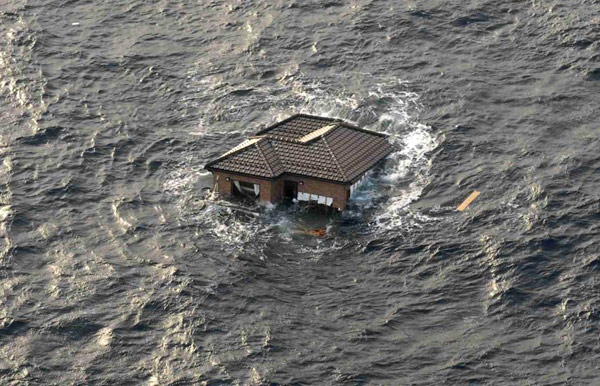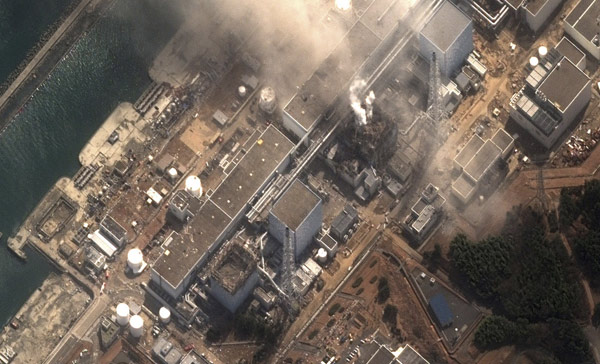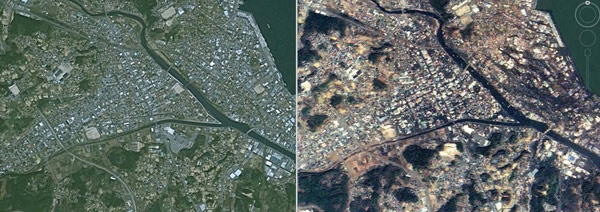Latest News
Japan quake aftermath -- Live Report
(chinadaily.com.cn)
Updated: 2011-03-15 10:29
 |
Large Medium Small |
| March 15 (Beijing Time) |

|
11:20 pm |

|
10:55 pm |

|
10:55 pm |

|
10:25 pm |

|
10:05 pm |

|
9:55 pm |

|
9:45 pm The quake could be felt in Tokyo where buildings swayed. |

|
9:43 pm |

|
9:40 pm Putin said in a meeting that he has requested the Energy Ministry, the Natural Resources Ministry, and the Russian Federal Atomic Energy Agency Rosatom to "carry out an analysis of the current condition of the atomic sector and an analysis of the plans for future development." "We should be ready to act under any scenario," Putin said, adding that the departments should submit their assessments to the government "within a month." Japan's Fukushima nuclear plant was damaged during the massive 9.0-magnitude quake and its ensuing tsunami on March 11. After the first blast in the plant, Russia began to closely monitor the radiation level, especially in the Far East.
|

|
9:30 pm Japanese data indicate that radioactivity levels fell over a six-hour period on Tuesday at a nuclear power plant damaged by last week's earthquake and tsunami, the U.N. nuclear watchdog said. The International Atomic Energy Agency (IAEA) said about 150 people had received monitoring for radiation levels and that measures to "decontaminate" 23 of them had been taken. |

|
9:05 pm |

|
9:00 pm Lufthansa airlines says its two daily flights between Germany and Tokyo will be diverted due to huge delays at the city's main international airport. Airline spokesman Thomas Jachnow says the daily flight from Frankfurt to Tokyo will be diverted to Nagoya and a flight from Munich will be diverted to Osaka at least through Sunday. He says the flight from Frankfurt to Tokyo is usually operated with an A380 superjumbo, but the airline is now using a smaller A340-600 with a capacity of about 400. That is about 120 less than the A380. Jachnow said Tuesday "the capacity at the moment still seems to be sufficient." Tuesday's flights were both expected to return to Germany several hours late due to the situation at Narita airport. |

|
8:53 pm |

|
8:48 pm The Airbus-300 has 272 seats, nearly double the number of seats with the Airbus-321, the company said. |

|
8:43 pm Japanese data indicate radioactivity levels have fallen sharply at the Fukushima nuclear power plant damaged by last week's earthquake and tsunami, the U.N. nuclear watchdog says. The International Atomic Energy Agency (IAEA) says a radiation dose level of 11.9 millisieverts (mSv) per hour was observed at the main gate of the plant at 0000 GMT on Tuesday. Six hours later, the rate had declined to 0.6 mSv. The IAEA uses the unit to measure doses of radiation received by people. |

|
8:38 pm The US Federal Aviation Administration on Tuesday said it was prepared to take action including the rerouting of flights to Japan if the nuclear crisis there worsens. "If this scenario were to occur, we anticipate that the US carriers and other operators flying in the affected airspace would revise their flight schedules," the US agency said in a statement. |

|
8:33 pm France's ASN nuclear safety authority said on Tuesday the nuclear accident at Tokyo Electric Power Co's Fukushima Daiichi plant could now be classed as level six out of an international scale of one to seven. |

|
8:30 pm Radiation levels in Chiba prefecture neighbouring Tokyo are more than 10 times above normal levels, Kyodo News reports. |

|
8:28 pm The radiation level in Tokyo was 10 times normal on Tuesday evening, but there was no threat to human health, the city government says. |

|
8: 25 pm Kyodo news agency reports Prime Minister Naoto Kan was furious with TEPCO executives for delays in informing his office about the latest explosion at the plant. It also said he asked TEPCO not to withdraw employees from the facility. |

|
8:05 pm China's embassy in Japan on Tuesday called for an orderly evacuation of Chinese nationals from the areas worst hit by the catastrophic earthquake and ensuing damage to nuclear reactors. The Chinese embassy has been making an all-out effort to rescue and help Chinese citizens affected by Friday's massive earthquake and resulting devastating tsunami, it said in an urgent notice posted on its website. |

|
7:52 pm China's Ministry of Defense said Tuesday the country's military is willing to offer quake-relief materials and rescue teams to Japan after a 9.0-magnitude earthquake devastated the country last week. Apart from relief materials, the armed forces could also send medical, rescue, or disease prevention teams or a hospital ship to the quake zone as soon as possible to "help the Japanese overcome the difficulties," the ministry said in a statement on its website. |

|
6:20 pm |

|
5:30 pm Shares around the world continue to dive as the markets react to the growing nuclear crisis caused by Friday’s massive earthquake. The chill was felt in Europe, where shares were sharply lower in early trading. Britain's FTSE 100 lost 1.4 percent to 5,692.31, Germany's DAX was 2.6 percent down to 6,692.18 and France's CAC-40 sagged 1.8 percent to 3,803.27. Wall Street was bracing for a setback, with Dow Jones industrial futures down 1.4 percent to 11,763 and S&P 500 futures down 1.6 percent to 1,270.30. China's benchmark Shanghai Composite Index fell 41.37 points, or 1.41 percent, to 2,896.26. The Shenzhen Component Index dropped 252.97 points, or 1.95 percent, to 12,705.32 points. |
|
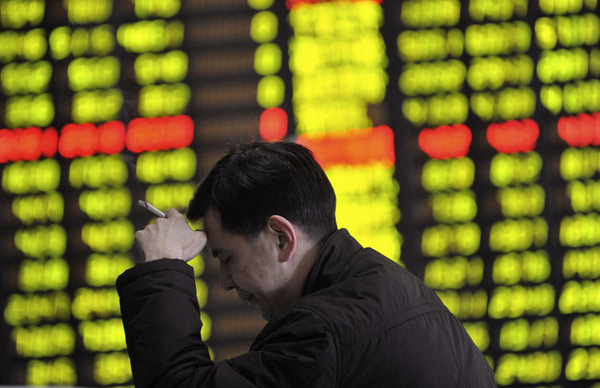 A man smokes in front an electronic board showing stock information at a brokerage house in Shenyang, Liaoning province March 15, 2011. [Photo/Agencies] |

|
5:24 pm The Japanese nuclear safety agency says there are two eight-metre holes in the wall of Fukushima No 4 outer building after the blast there, Reuters reports. |

|
5:11 pm Rescuers have found a 70-year-old woman alive four days after the disaster struck and she was washed away by the tsunami in northeastern Japan's Iwate prefecture, AP reported. |

|
5:02 pm Japanese soccer league clubs held an emergency meeting Tuesday and decided to postpone league matches indefinitely, local media reported. |

|
4:58 pm The Ministry of Commerce (MOC) said Tuesday they have not been able to contact 261 Chinese people in Japan's quake-hit regions as of 10:00 am Beijing time on Tuesday. |

|
4:48 pm A spent nuclear fuel pool at Fukushima reactor 4 may be boiling, and the water level falling exposing nuclear rods, according to local media. |

|
4:45 pm China remains unaffected from radioactive leakages following another explosion at the Fukushima nuclear plant of Japan, said the country's nuclear watchdog on Tuesday. The National Nuclear Safety Administration, under China's Ministry of Environmental Protection (MEP), made the statement in a press release based on environmental monitoring results taken by 10 am Tuesday. China's MEP said it will closely follow the situation, and upgrade monitoring efforts. On March 12, the MEP began nationwide radiation monitoring, with results released on its official website. |

|
4:40 pm The World Health Organisation says Japan is making the correct public health measures to protect the population from radiation, according to Reuters. |

|
4:00 pm Chief Cabinet Secretary Yukio Edano says radiation levels taken at 3:30 pm at the front gate of the Fukushima Daiichi complex have fallen dramatically to 596.4 microsieverts per hour. That level is almost 700 times less than the levels reported near the reactors in the morning, after two fresh blasts at the complex. |

|
3:35 pm China on Tuesday became the first to organize an evacuation of its citizens from Japan's northeast following radiation leaks at a quake-damaged nuclear power plant, Xinhua reported. Authorities added that radiation levels have not increased in China. |

|
3:20 pm
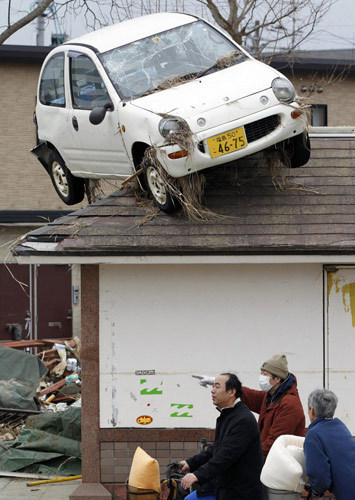 A car is seen on the rooftop of a house near residents talking in an area hit by an earthquake and tsunami in Sendai, northeastern Japan March 15, 2011. [Photo/Agencies] |

|
3:12 pm Russia says radiation levels rose slightly on Tuesday, but the results were still within normal levels, Reuters reported. |

|
3:09 pm EVA Airways, Taiwan's No 2 airline, told Reuters on Tuesday it would cancel flights to Tokyo and Sapporo until the end of March, following Japan's earthquake and subsequent crisis at a nuclear power complex. |

|
3:01 pm A fire in No 4 reactor of Fukushima nuclear plant in northeast Japan has been put out, according to the International Atomic Energy Agency. The plant operator has informed the IAEA the blaze was caused by a hydrogen explosion. The fire followed an explosion in the No 2 reactor at 6:20 am local time. Workers are continuing to pour seawater on the No 3 reactor. |

|
2:58 pm Japan's central bank pumped billions more into the financial system Tuesday to quell fears that the country's banks could be overwhelmed by the impact of the massive earthquake and tsunami, AP reports. Two cash injections totaling 8 trillion yen ($98 billion) came a day after the Bank of Japan fed a record 15 trillion yen ($184 billion) into money markets and eased monetary policy to support the economy in the aftermath of Friday's 8.9 magnitude quake that has killed thousands. |

|
2:37 pm Japan's transport ministry has banned aircraft from flying within 30 kilometers of the Fukushima No 1 nuclear power plant amid escalating nuclear crisis, according to Xinhua news agency. The move excludes aircraft engaged in search and rescue operations, and is not expected to have a large impact on scheduled commercial flights in the country, the report said. |

|
2:30 pm Shares on Tokyo’s stock market closed down 10.55 percent as fearful investors abandoned stocks over rising radiation levels at the Fukushima plant, according to Japan NHK TV. |

|
2:25 pm
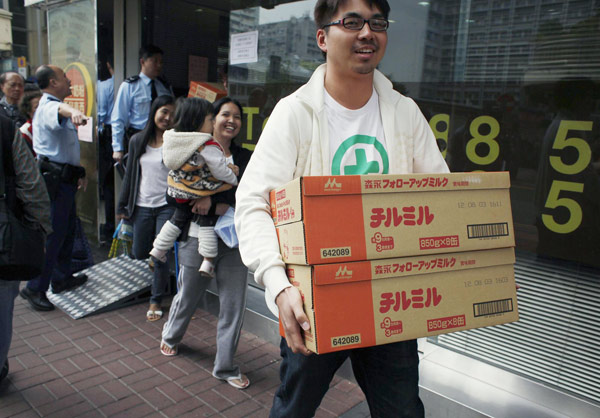 A family buys boxes of Japanese milk powder from a store in Hong Kong March 15, 2011. Hundreds of people in the region, worried that future Japanese milk powder would be contaminated by radiation, lined up for the product. [Photo/Agencies] |

|
2:20 pm Canned goods, batteries, bread and bottled water have vanished from store shelves across Japan, and long lines of cars circle gas stations as panic-buying grips under the ensuing nuclear crisis, AP reports. |

|
2:16 pm The municipal government in Tokyo has recorded radiation levels 23 times more than normal. All of Japan’s 47 prefectures have been ordered to report the results of their environmental radiation observations every day, according to Japan NHK TV. |

|
1:58 pm Hawaii and California in the US suffered tens of millions of dollars worth of damage from tsunami caused by Friday’s massive earthquake in Japan, according to AP. The most serious damages were near Kealakekua Bay and Kailua-Kona on the Big Island. Haleiwa and Keehi Lagoon on Oahu, as well as areas of Maui and Molokai, also lost significant value. |

|
1:22 pm More than 200 aftershocks have rattled Tokyo since Friday’s massive quake struck. Meteorologists are warning more aftershocks are expected which could spark another tsunami, according to Japan NHK TV. |

|
1:14 pm Thailand will randomly test imported Japanese food products for possible radiation contamination, the country's Food and Drug Administration said on Tuesday in a report by Reuters. |

|
1:07 pm Amazing photos |
|
|
|
|
|
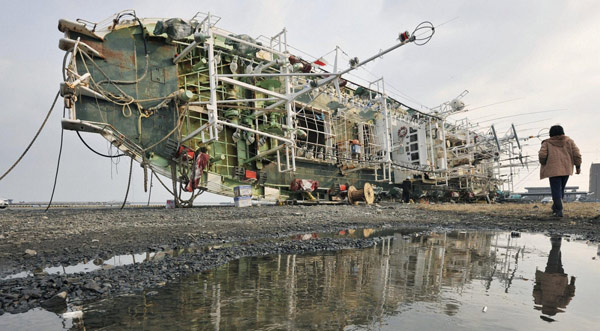 A survivor passes a ruined fishing boat on Sunday in Aomori, northern Japan. [Photo/Agencies] |

|
12:15 pm Higher than normal radiation levels are detected in Tokyo, but a government official says the levels in the city are currently not seen as harmful to health. |

|
11:30 am Japan before and after the earthquake and tsunami
|

|
11:23 am Japanese stocks continue to plunge to their lowest level in two years. $500 billion has been wiped from the market in two days. The benchmark Nikkei 225 Stock Average plunged 606.61 points. |

|
11:11 am Winds over the leaking nuclear plant are blowing slowly towards the Kanto region, which includes Tokyo, Reuters reports. The French embassy in the capital has warned in an advisory that a low level of radioactive wind could reach Tokyo within 10 hours. |

|
10:58 am Japan's chief cabinet secretary Yukio Edano says radiation around the Fukushima nuclear plant is 400 milli sieverts, thousands of times higher than readings taken before the blast, which could be harmful to human health. |

|
10:49 am The latest on the worsening situation at the Fukushima nuclear plant is as follows. No 4 reactor is on fire. Explosion heard at the No 2 reactor shortly before 7 am this morning. Smoke can be seen coming from No 3 reactor. Residents within 20 km have been evacuated. People within 30 km have been urged to stay indoors as leaking radiation had reached levels that could harm human health. |

|
10:32 am Japan's chief cabinet secretary Yukio Edano says No 4 reactor at the Fukushima nuclear plant is on fire. |

|
10:28 am Japan PM Naoto Kan addresses the nation in a live TV address that the situation at the Fukushima nuclear power plant is of great concern and asks people to act calmly. The official death toll from the earthquake and tsunami has topped 2,400, but police say the number will exceed 10,000. A third explosion in four days rocks the nuclear plant at 6am this morning releasing radioactive substances that could harm human health. Residents within 20 km of the power plant have been ordered Two million people are without power and rolling blackouts are in place affecting three million customers. |

|
10:07 am In a live television address Prime Minister Kan said: “We need now for everyone to move from within a 20 km radius from Fukushima No 1 plant…this incident is of great concern and I ask you to act calmly.” |

|
10:05 am Prime Minister Kan tells the Japanese people: “please listen to my message calmly…the emergency diesel engine that should have been used to cool the reaction have gone out of function…radiation has spread from these reactors and the reading is very high.” |

|
9:07 am A fresh explosion rocked a stricken Japanese nuclear power plant on Tuesday and some workers were ordered to leave the site, a sign that the situation may be getting more serious at the complex that was damaged by a massive earthquake and tsunami. |

| March 14 |

|
2,000 bodies found on Japan's shores 2,000 bodies were found Monday on two shores in Japan's Miyagi Prefecture following last Friday's devastating Magnitude 9.0 earthquake and massive tsunami, Kyodo News reported. |

| March 13 |

|
Japan fights to avert nuclear meltdown Japan fought on Sunday to avert a meltdown at two earthquake-crippled nuclear reactors, describing the massive quake and tsunami, which may have killed more than 10,000 people, as the nation's biggest crisis since World War II. |
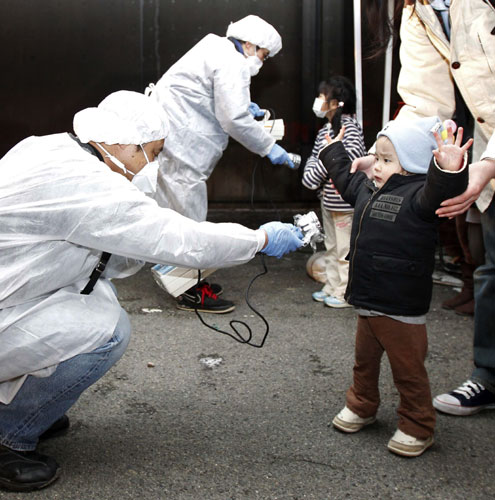 Medical officials check for signs of radiation on children from the evacuation area near the Fukushima Daiichi nuclear plant in Koriyama, Japan, on Sunday. [Photo/Agencies] |
| 分享按钮 |
